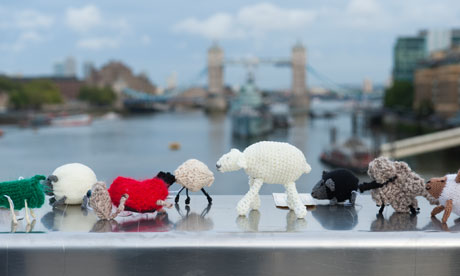It's a blustery Sunday afternoon on London Bridge and I'm exercising my right – or at least, the right of freemen in 11th-century London – to herd sheep across the Thames. They're not real sheep, thankfully. They're tiny knitted creatures, with spindly legs and multicoloured bodies, and snapping at their heels is a gnarly-looking wolf in sheep's clothing.
Confused? Welcome to the world of graffiti knitting, or yarn bombing as it's generally known. If you haven't encountered it before, you might just over the next few days, as knitters across Britain celebrate wool week by "tagging" lamp-posts with knitted doilies, wrapping public statues in scarves and sending knitted animals scurrying about city streets. I can't say exactly where, though, as it's all hush hush.
My introduction to yarn bombing came courtesy of Knit the City, a tight-knit (sorry) London-based crew with fanciful names: my accomplices today are Deadly Knitshade, the Fastener and Shorn-a the Dead. For their Knitmare Before Christmas project, they attacked the statue of a ballerina outside the Royal Opera House with figures inspired by The Nutcracker, while Web of Woe found them installing a 13ft spider's web, replete with trapped insects and fairies, in the "graffiti tunnel" beneath Waterloo station.
Knit the City was established in April 2009 by Lauren O'Farrell, whose first act was to rechristen her group's activities yarn storming. "In London, you can't go throwing the word bombing around," she says. "Yarn storming sounds more creative than bombing, which is destructive. It's a bit more kooky and eccentric." You might say the same of O'Farrell, who started knitting five years ago to distract herself from the treatment she was undergoing for cancer and, in March 2007, celebrated getting the all-clear by tying a 550ft scarf around the lions in Trafalgar Square.
"Kooky and eccentric" is also a good description of Magda Sayeg, the Texas woman credited with starting the yarn bombing movement. Sayeg was managing a clothes shop in 2005 when she was struck by the ugliness of its steel-and-concrete surroundings. Overwhelmed by "a selfish desire to add colour to my world", she knitted her shop a door handle. Then she knitted a sheath for the stop-sign pole across the road. "People got out of their cars and took photos in front of it," she recalls. Seduced by these positive reactions, she began splattering bits of knitting across the world: over parking meters in Brooklyn, over a bus in Mexico, most recently over the gun carried by an 8m-high statue of a soldier in Bali, neutering its violence.
"In this world of technology, over-development, fewer trees and more concrete," says Sayeg, "it is empowering to be able to beautify your environment." It's a quiet political message, but a potent one – and knitters around the world have followed her lead. The results range from the comic (woolly hats and looped moustaches on statues) to the soppy (Swansea's Yarnarchists attaching knitted hearts to street railings on Valentine's Day this year).
There is another reason, Sayeg thinks, for yarn bombing's appeal among knitters: "It has inspired them to do something beyond the functional." O'Farrell agrees: "We're changing the face of craft. Now I feel that I'm an artist instead of just a knitter." Both admit they haven't the patience for conventional knitting. "What I love about yarn bombing," says Sayeg, "is that you can knit something in 30 minutes. You can finish a stop-sign pole by the time you finish watching a movie." O'Farrell has knitted just one jumper in her life – and that was for a one-week-old piglet. "I'd sit in front of a pattern and think, 'Look how much knitting I'm going to have to do to make something that other people have made before.' Eventually, I decided I didn't want to knit anything normal."
It was the potential for marrying art and knitting that appealed to Rachael Elwell, a fine artist based in Salford. Since discovering Sayeg in 2008 – and doing a bit of yarn bombing herself, notably a cosy for a garden shed – her work has taken a turn for the woolly. This month, she's running a project called Crocheting Accy: once a week, she sits in the indoor market in Accrington, teaching passers-by how to crochet, then transforming their creations into a floral installation. Like Sayeg, she has been amazed by people's reactions. "I've come to realise that knitting has a strong community vibe to it," she says. "Everyone's got a social connection to it."
This might explain the increasing desire of councils and art institutions to commission yarn bombers to create official works of art. In August, Belfast was comprehensively yarn bombed at the instigation of Craft Northern Ireland, a government-backed organisation supporting the craft industry. Sayeg has been invited by cities across the US to liven up their public spaces, and O'Farrell is finding it increasingly difficult to separate her guerilla activities from the teaching and charity events she is engaged in as part of her day job, managing the knitting community, Stitch London.
The nostalgic appeal and cosy image of knitting also accounts for the yarn bomber's ability to evade the authorities. "There is a side to it that is unsanctioned," says Sayeg, "but you'd have to be the most bored police officer to want to arrest me." Knit the City have been questioned by the police only once, while tackling a phone box opposite Big Ben. "The minute we said it was a craft project, it was fine," says O'Farrell. "They gave us a stop-and-search notice that said, 'Seen decorating a telephone box on Parliament Square.' Then one of the policemen took pictures of us on his phone for his wife."
• More details: stitchldn.com, knitthecity.com, artyarn.blogspot.com, magdasayeg.com
















































